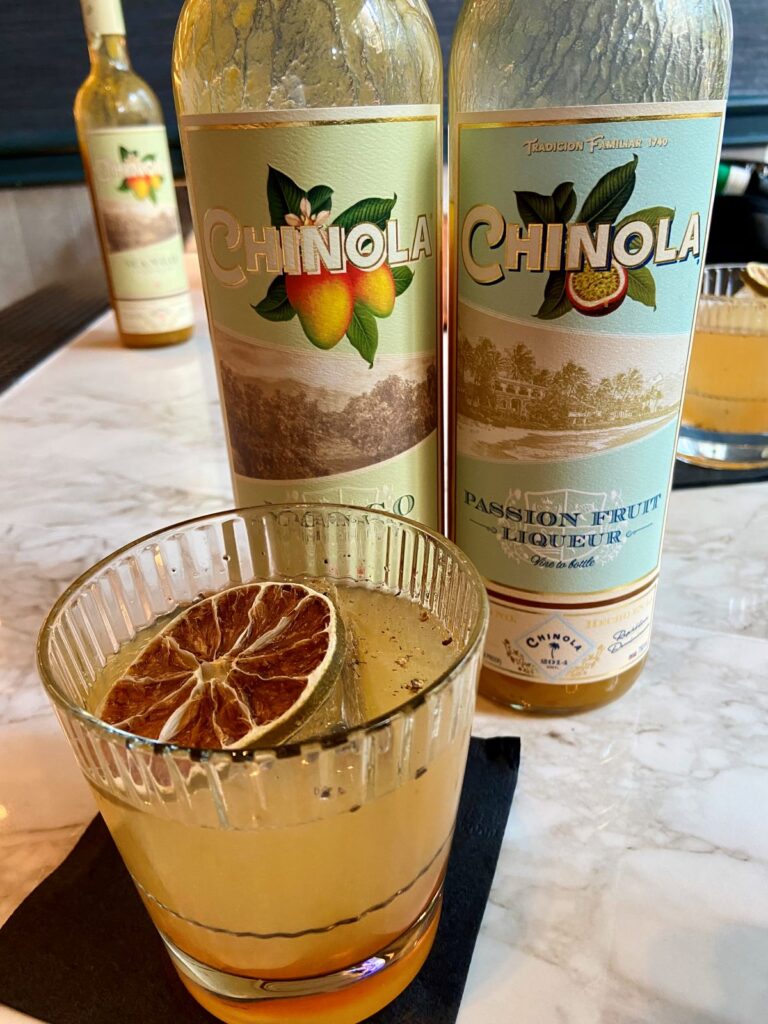
Alcohol trends forever evolve, which can benefit new brands that reflect changing consumer preferences. For instance: Chinola Fresh Fruit Liqueurs.
This small line of fruit liqueurs has grown impressively since launching in the 2018/19 timeframe. Especially considering immediate challenges faced during the pandemic. From modest beginnings, Chinola is on pace for 60,000 cases sold this year, according to cofounder Andrew Merinoff.
Why the rapid success? It helps having a number of savvy industry insiders behind the brand, as Chinola does. And it helps to represent a cross-section of modern trends.
In this brand you will find: All-natural/better-for-you ingredients, cultural authenticity, at-home mixology, social media proficiency and — particularly relevant with younger drinkers — the right social values.
Notably, Chinola operates with ethical treatment for Dominican Republic farmers. The producers who cultivate tropical fruits for this farm-to-bottle liqueur. Chinola comes in two flavors: the initial Passion Fruit, and the new Mango. Using all-natural ingredients for these flavors requires a certain kind of fruit and production methods. “We went to the local farming community and explained what we wanted,” Merinoff says. “No pesticides, no herbicides. Fruit grown biodynamically, with honeybees for pollination. We’re working with 500 local farming families.”
“We helped bring roads, power and drinking water right to these farming communities,” Merinoff adds. “Consumers today want to know how their food and drink is made. Do these brands pay their people fair wages? Do these brands leave places better off than they found them?”
This level of ethical treatment of employees, especially local producers, is fast becoming another sign of companies with the right social values. Consumers increasingly prefer products whose social values match their own. Look for more alcohol products to act accordingly: Showcasing their ethical employee and community relationships.
For Chinola and Merinoff, their journey began about a decade ago. Another cofounder happened upon a local blender in the Dominican Republic making all-natural fruit liqueurs. Of these blends, the passion fruit stuck out. Merinoff agreed when he later sampled it himself.
“There wasn’t an all-natural, citrus-forward liqueur in the market,” he recalls. “It was all synthetic stuff. These purees, they have no shelf stability. And in a market like New York City, they take up precious refrigeration space.”
Four-and-a-half years and 2,200 test batches later, the Chinola team landed on a final recipe.
“There were only three of us, keeping our day-time jobs,” Merinoff explains. “We were doing 20, 30 cases at a time for our friends who were bartenders. The people at [New York bar] The Broken Shaker tried it and loved it. They supported it and became partners in the brand.”
Chinola launched around 2018/19. By 2020, they were in bars and restaurants in six states. On-premise represented 95% of their business, which became problematic when Covid-19 swept in with disastrous results.
Like so many brands around this time, Chinola was forced to pivot. With on-premise shut down, off-premise retailers became the focus. At-home mixology presented an opportunity, as did social media.
“We started simple: How can we make at-home mixology easy?” Merinoff explains. “We worked with furloughed bartenders on social media content. For instance, you have that sparkling wine sitting on the shelf. How can you turn that into a Mimosa?”
“Once you can mix two things together in a glass, then you can learn how to mix three, four,” he adds. “During Covid, people got hours back into their days, time to learn new things. We started with simple educational content. And we helped people build out their back bars. We helped people figure out what else they had to add.”
Chinola survived Covid, and today finds itself on an excellent growth curve. The brand is in 35 states and 13 countries. Some consumer education remains, however. Using all-natural recipes leaves residuals clinging to the insides of the bottles. To those in the know, that’s a good sign.
“That’s what we do,” Merinoff says. “We put real fruit into bottles and we’re not ashamed of it.”
Kyle Swartz is editor of Beverage Dynamics. Reach him at kswartz@epgmediallc.com. Read his recent pieces, What’s New at Your Favorite Kentucky Bourbon Distilleries? and The 2024 Spirits Growth Brands Awards — Top Spirits Trends.




